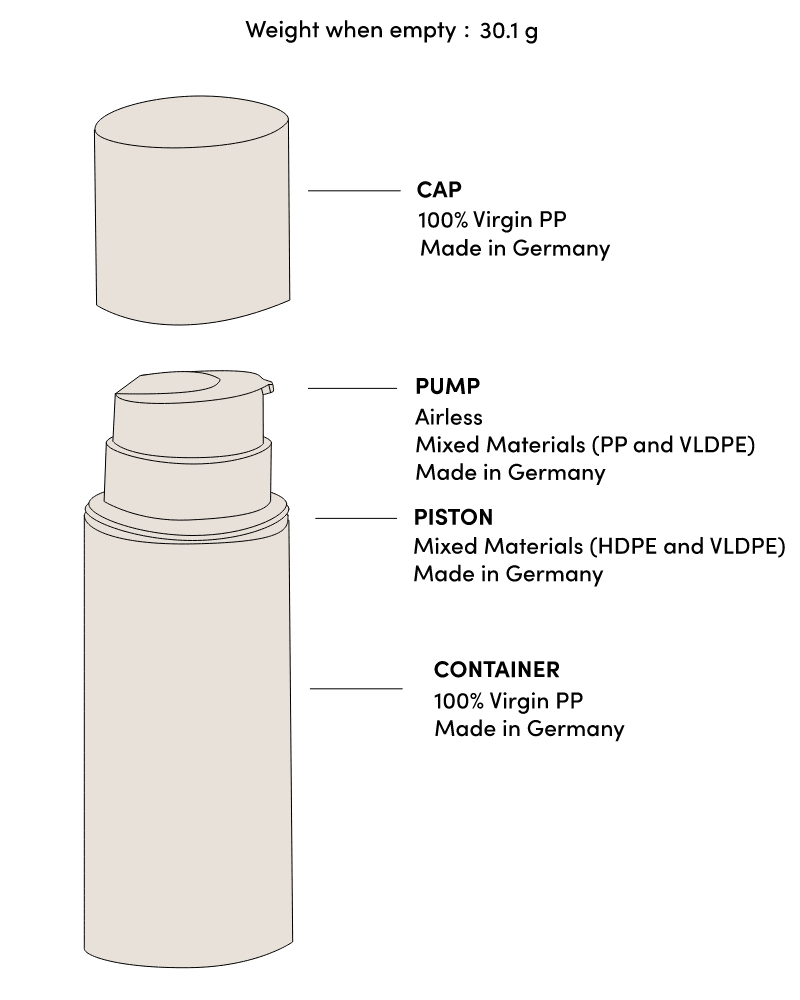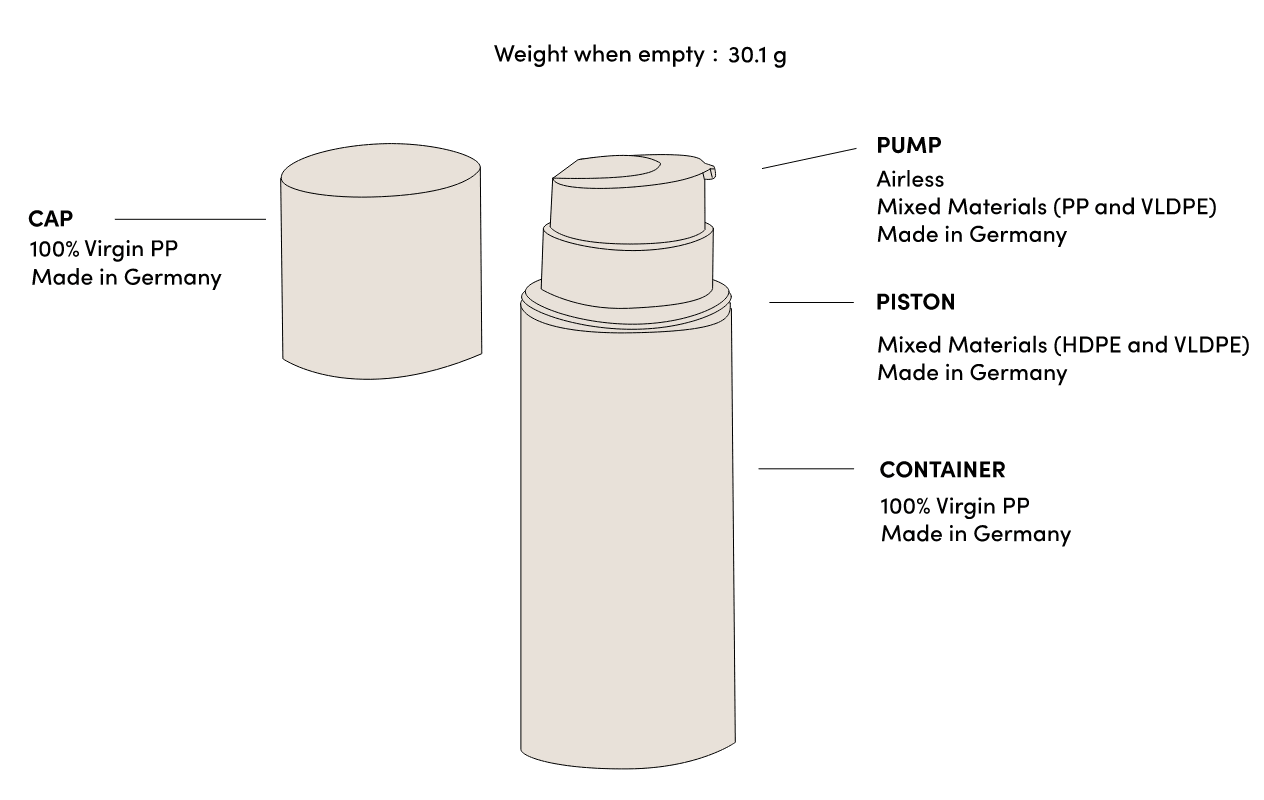Face Sunscreen
Your Face Sunscreen will be matched to your skin after you’ve completed the skin test. That’s also why your name will be on the label.
Your sunscreen contains antioxidants as well as moisturising and non-comedogenic ingredients. It protects you from both UVA and UVB rays, is very water resistant and certified reef friendly.
And of course, it does not contain any alcohol denat., perfumes or colourants - making it suitable to use on both sensitive skin and for children.
However, since it’s the sunscreen that matches your skin, we can only tell you the exact combination once you’ve told us more about your skin and your needs. Naturally, the final ingredients will be listed on your product.
Available in SPF 30 and 50.
All about our Face Sunscreens
There isn't SPF in our Face Creams. Apply face cream first, wait for it to absorb, and then apply sunscreen.
Studies point to the fact that you won’t achieve the necessary protection from SPF in face creams. Here’s why:
- Face creams aren’t applied as thoroughly as sunscreens.
- Face creams aren’t applied as often as necessary (you should reapply every 2-3 hours).
- The indicated amount of SPF in the face cream doesn’t have the expected effect when actually being used.
SPF in face creams and makeup is, as a rule of thumb, not enough to protect you an entire day, unless you apply it several times during the day and in the right amount.
Our stance is that face creams and sunscreens are different types of products that should be used separately and according to need.
Sunscreen should be applied all year round, since UV rays are always there and penetrate both clouds and windows.
We recommend always using sunscreen, also when you’re staying inside. This is due to the fact that the sun’s UV rays are able to penetrate windows, meaning you’re also at risk for exposure to UV rays even when being indoors.
We recommend that you apply your sunscreen before your makeup. Start with cleansing your face in the morning, applying your moisturiser, wait for about 10 minutes, and then apply sunscreen. When the sunscreen is absorbed into your skin, you can apply your makeup.
Applying sunscreen over your makeup can be difficult so if you want to reapply sunscreen, we recommend that you pat it on top of your makeup, either with your hands or with a synthetic makeup sponge. However, you won’t achieve the same level of protection from the sun when applying sunscreen on top of makeup as you would applying directly onto the skin.
We use chemical filters in our sunscreens. The chemical filters we use (like Octyltriazone and Iscotrizinol) are reef friendly. Besides that, chemical filters don't leave a white cast on the skin, making it great for all skin tones.
Lastly, physical filters are often formulated with Alcohol Denat, which can be irritating for the skin and even dry it out. The filters in our sunscreens are oil soluble and are formulated to suit all skin types - even sensitive skin.
The SPF number indicates how long the sun’s UV rays will take to produce a slight redness on your skin when you’re using the product as indicated on the package, in relation to how long it would take if you didn’t use the product. In other words, with SPF 30 it will take 30 times longer to get red than if you don’t use SPF at all.
SPF 30 allows about 3% of UVB rays to hit your skin, while SPF 50 only allows about 2% of the UVB rays to hit your skin. It might seem like a tiny difference, but in reality, SPF 30 allows 50% more rays to hit your skin than SPF 50.
Remember to always be careful when staying in the sun - even when wearing sunscreen. Sunscreen can create a false sense of safety towards the sun and typically people tend to stay in the sun for longer periods of time, because they think they’re protected against the sun.
When it comes to sun protection - more is more. Always wear a little more than a little less, and remember to reapply during the day (every 2-3 hours).
The short answer is no. Studies point to the fact that you won’t achieve the necessary protection from SPF in face creams. Here’s why:
- Face creams aren’t applied as thoroughly as sunscreens.
- Face creams aren’t applied as often as necessary (you should reapply every 2-3 hours).
- The indicated amount of SPF in the face cream doesn’t have the expected effect when actually being used.
SPF in face creams and makeup is, as a rule of thumb, not enough to protect you an entire day, unless you apply it several times during the day and in the right amount.
Our stance is that face creams and sunscreens are different types of products that should be used separately and according to need.
We always recommend the highest possible protection against the sun.
SPF 30 allows about 3% of UVB rays to hit your skin, while SPF 50 only allows about 2% of the UVB rays to hit your skin. It might seem like a tiny difference, but in reality, SPF 30 allows 50% more rays to hit your skin than SPF 50.
Remember to always be careful when staying in the sun - even when wearing sunscreen. Sunscreen can create a false sense of safety towards the sun and typically people tend to stay in the sun for longer periods of time, because they think they’re protected against the sun.
When it comes to sun protection - more is more. Always wear a little more than a little less, and remember to reapply during the day (every 2-3 hours).
The filters that we use in our sunscreens are oil soluble. We chose those filters in order to create sunscreens that are close to Face Creams in terms of texture, so they don't dry out the skin and gives a good moisturising effect.
All our sunscreens are reef friendly certified by BIORIUS. We formulated all our sunscreens with chemical filters (like Octyltriazone and Iscotrizinol) that are reef friendly. We also don't use any nanomaterials and ingredients or preservatives that are toxic to coral reefs. On top of that all our sunscreens are very water resistant.
Read more about the certification criteria here.
Besides being safe for marine life, our sunscreens are also safe for your skin. All our face sunscreens are tested and approved non-comedogenic, therefore completely suitable even for users with acne-prone skin.
Historically, and unfortunately still today, some sunscreens contain ingredients that can damage coral reefs. We consciously choose ingredients that don't harm aquatic life for our sunscreens.
We want you to be extra comfortable about your sunscreen being safe for marine life, which is why we decided to externally verify it. There are numerous certification bodies out there following more or less the same criteria. We chose BIORIUS for its long-standing expertise. It follows best practices in assessing sunscreen formulations in line with environmental safety regulations of the Hawaii reef bill.

